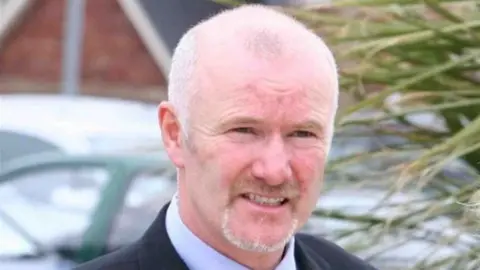'New evidence' on mental health and control of double killer Stewart
 PA Media
PA Media"Fresh evidence" has emerged in the case of double killer Hazel Stewart over her mental health at the time of her crimes and claims she was under the coercive control of her former lover, a court has been told.
The former Sunday school teacher appeared before the Court of Appeal via video link from prison, where she is serving a minimum of 18 years for killing her policeman husband and the wife of her ex-lover Colin Howell.
She is seeking permission to mount a fresh bid for an earlier release from jail.
Howell, a former dentist, pleaded guilty to the murders in 2010.
'Suffering from depression and PTSD'
Stewart was convicted of the double murder by a unanimous jury verdict at in March 2011.
On Friday, the court heard "new evidence" in the case concerning Stewart's mental health at the time of her offending.
Brendan Kelly KC, acting on her behalf, told the court new evidence had come to light from a psychiatrist who believed Stewart had been suffering from depression and PTSD at the time of the murders of Constable Trevor Buchanan, 32, and Howell's 31-year-old wife Lesley Howell in 1991.
He told the court: "At the time of the killings, there is evidence that the applicant was suffering from two forms of mental health - depression and PTSD - and coupled to the coercive behaviour of the co-defendant, these are features that ought to have been taken into account when determining the minimum term of the life sentence.
"That's what is at the core of this application."
Psychiatrist's view a 'minority one'
He argued at the time of Stewart's sentencing in 2011, the issue of coercive control was not fully understood, in particular in the context of mental health.
He suggested had it been understood at the time of Stewart's sentencing, the new evidence would have been admissible.
However, Philip Henry KC for the Crown told the court the opinion of Dr Harding, the psychiatrist cited by Stewart's legal team, was a "minority" one "without any support from other doctors".
He referred to reports compiled by five other psychiatrists, none of whom, he said, identified mental illness in Stewart.
He said those reports had been compiled closer to the time of the trial and sentencing, and were based on the same information that Dr Harding had based his more recent report on.
"None of them had any concerns about mental illness at the time of the offending," he said.
The court also heard submissions regarding whether or not it had jurisdiction to hear an appeal in this case.

The bodies of Constable Buchanan and Lesley Howell were found in a fume-filled garage in Castlerock, County Londonderry, in 1991.
Police originally thought they had killed themselves in a suicide pact after discovering their partners were having an affair.
They were, in fact, murdered before their bodies were arranged to make it look like they had taken their own lives.
It took nearly two decades for the truth to emerge when Howell, 52, suddenly confessed to both killings.
He was subsequently sentenced to a minimum of 21 years in prison.
Howell also implicated his former lover in the plot and gave evidence against her at her trial.
During the trial, the court heard that Howell had planned and carried out the killings and Stewart had facilitated them - by drugging her husband, allowing Howell into her house and disposing of a hose pipe used in the murder.
On Friday, Lady Chief Justice Siobhan Keegan said the court would reserve its decision in the bid for appeal.
She said the court would have to consider all that was said to the court and would await additional information from Stewart's team and the Crown.
She said the court would make its ruling in June.
